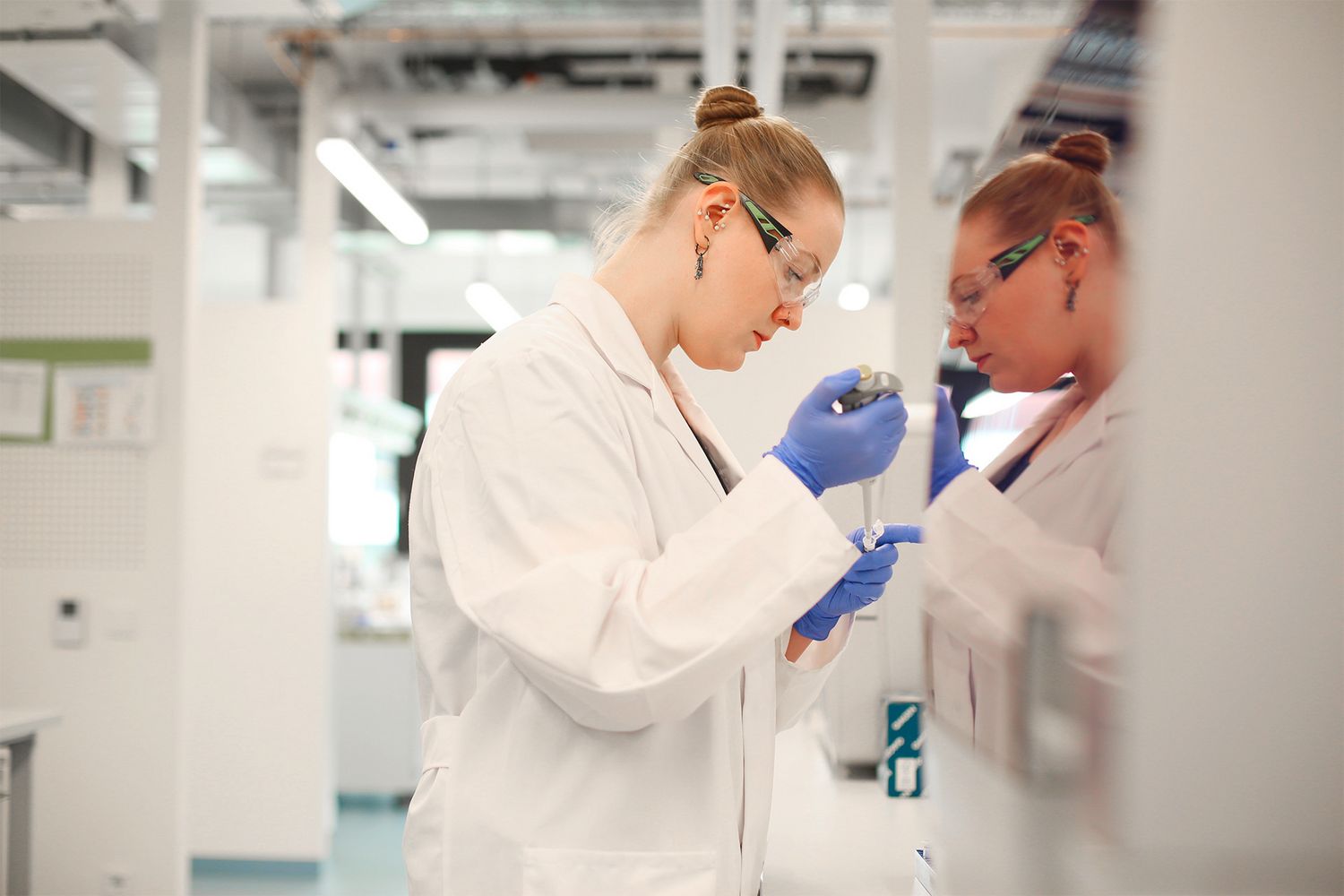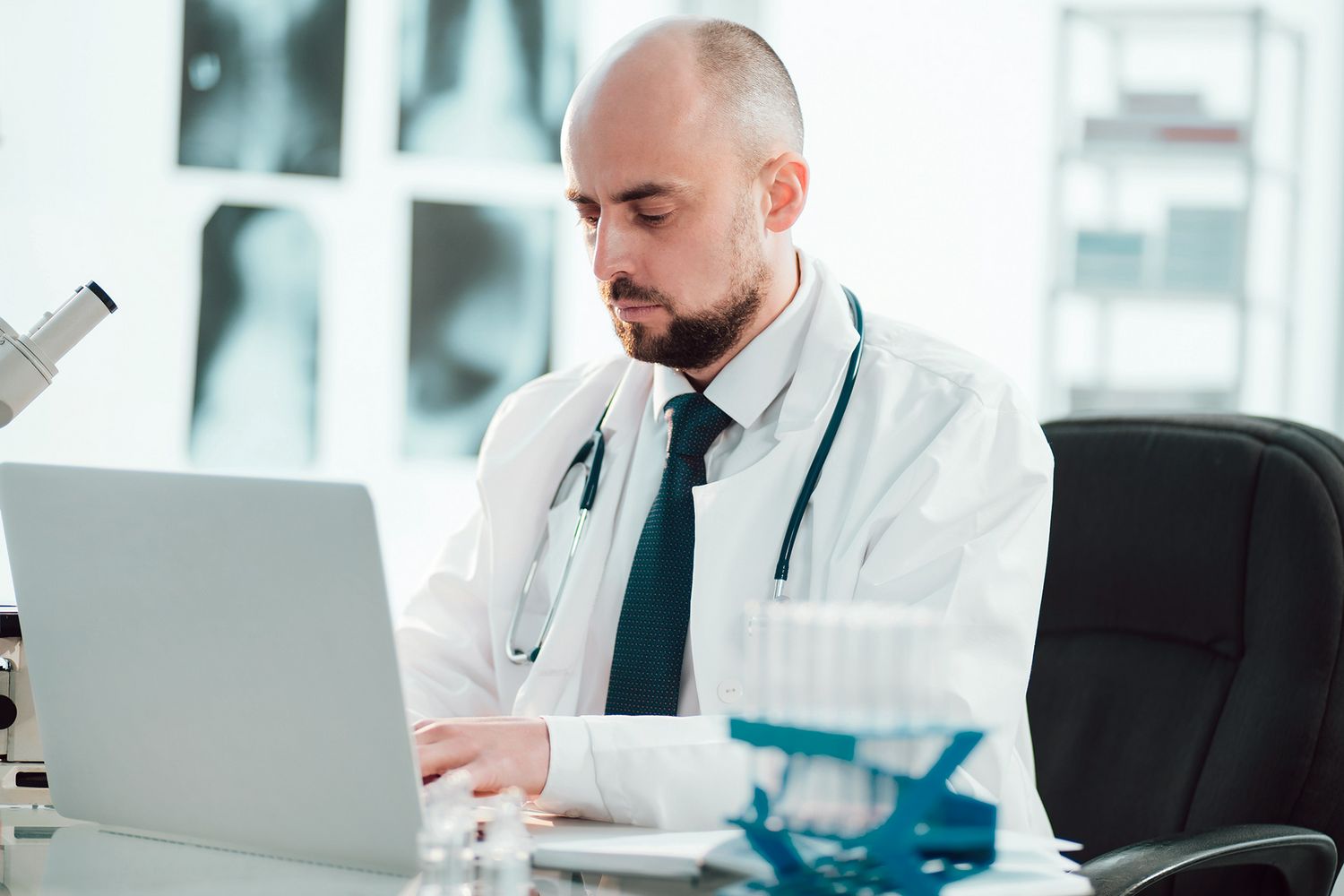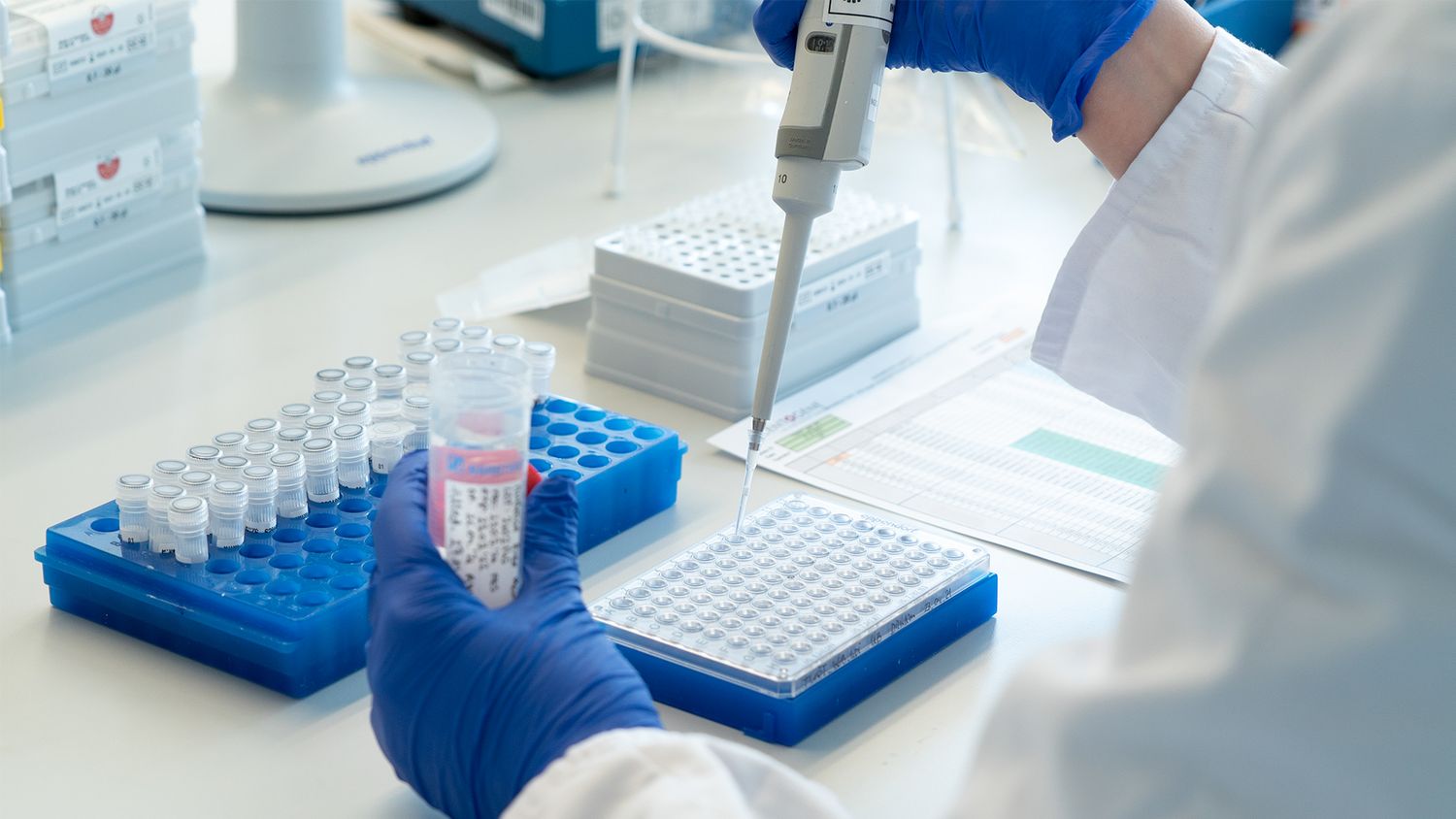NEW CentoGenome® – It's Covered
The world's most comprehensive Whole Genome Sequencing (WGS) tool for diagnosis of rare and neurodegenerative diseases – providing unparalleled genome coverage in a single test.
CENTOGENE’s Whole Genome Sequencing Service
Establishing a rapid and reliable diagnosis for rare and neurodegenerative diseases can be difficult, even for the most skilled physicians. Thanks to the latest technologies and scientific insights into genetic factors, this no longer has to be the case!
Introducing the world’s most comprehensive Whole Genome Sequencing (WGS) tool for diagnosis of rare and neurodegenerative diseases – NEW CentoGenome®.
This first-line test combines superior technology powered by a streamlined CE-IVD bioinformatics pipeline and the CENTOGENE Biodatabank, with approximately 700,000 patients representing over 120 highly diverse countries.
With NEW CentoGenome, you can significantly reduce time and resources to deliver a rapid and reliable diagnosis and identification of treatment options for your patients.
Why Choose CENTOGENE?
We offer the world’s largest genetic testing portfolio with 19,000 genes represented
Our tests offer a proven high diagnostic yield to enable an unparalleled level of certainty
We work with the hundreds of medical experts – meticulously interpreting, reviewing, and approving genetic lab results
Our multidimensional approach enables a complete clinical picture for the most holistic diagnosis, prognosis, and monitoring
We offer best-in-class medical reporting powered by the CENTOGENE Biodatabank with ~700,000 patients from >120 countries
Why Choose NEW CentoGenome?
Advanced Technology for Greater Insights
By implementing Polymerase Chain Reaction (PCR)-free technology, NEW CentoGenome significantly reduces bias and provides high-quality sequencing information for difficult-to-sequence genetic regions – enabling greater insights into coding, regulatory, and intronic regions.
Superior Performance for Enhanced Disease Coverage
In leveraging advanced data analysis with CE-IVD bioinformatics and medical expert-based interpretation powered by the CENTOGENE Biodatabank, NEW CentoGenome delivers superior variant detection.
Integrated Variant Reclassification and Confirmatory Testing for a Life-Long Commitment
As a world leader and trusted partner, CENTOGENE provides a free-of-charge and proactive diagnosis confirmation and variant reclassification program.
NEW CentoGenome
With NEW CentoGenome, you can significantly reduce time and resources to deliver a rapid and reliable diagnosis and accelerate treatment options for your patients.
Superior Technology With Unparalleled Clinical Coverage
Serving as a first-line test, NEW CentoGenome is the most comprehensive commercially available WGS test on the market for both rare and neurodegenerative disorders – covering almost all disease-causing variants, including most known repeat expansions associated with neurological diseases, in a single assay1. NEW CentoGenome also detects Copy Number Variations (CNVs) associated with Spinal Muscular Atrophy (SMA), as well as disease-causing variants associated with Gaucher Disease (GD) and susceptibility to GBA1-related Parkinson's Disease (PD), with the highest levels of sensitivity.
The newly designed WGS assay leverages a PCR-free approach. This significantly diminishes the typical bias induced by PCR and provides higher quality sequence data across the typically challenging regions of the genome by enabling more uniform coverage and superior performance in variant.
Features & Performance | |||||
|---|---|---|---|---|---|
| Genome Coverage |
| ||||
| Advanced and Sensitive Variant Detection |
| ||||
| Enhanced Detection of Variants Associated to SMA, and GD/PD*** |
| ||||
| Extra Diagnostic Confirmation**** |
| ||||
SNVs: single nucleotide variants; InDels: small insertions / deletions; SVs: structural variants; CNVs: copy number variations; UPD: uniparental disomy; mtDNA: variants in mitochondrial DNA.
* Variants with low quality and / or unclear zygosity are confirmed by orthogonal methods: SNVs and InDels by Sanger sequencing; CNVs by Multiplex ligation-dependent probe amplification (MPLA), quantitative polymerase chain reaction (qPCR) or chromosomal microarray (CMA)
** Screening of repeat expansions is performed by the ExpansionHunter. Screening of UPD is performed using an in-house algorithm for Mendelian inheritance errors (MIE) to detect runs of homozygosity (ROH) for the well-known clinically relevant chromosomal regions
*** Spinal muscular atrophy (SMA) screening is performed using SMN Caller algorithm to detect SMN1 / SMN2 CNVs. GBA1 screening is performed using Gauchian algorithm to detect recombination events affecting the region encompassing exons 9-11 (NM_000157.3), a region which has the highest homology to GBAP1
**** Internal confirmatory testing are obtained by orthogonal methods: fragment length analysis (FLA) for repeat expansions, CMA for UPD, MLPA for SMN1 / SMN2 CNVs, and qPCR for conversion events between GBA1 and GBAP1

When is WGS Recommended?
NEW CentoGenome is the ideal solution for diagnosing rare and neurodegenerative diseases. It serves as a first-line test to identify a molecular diagnosis in patients with suspected genetic disorders, or as a second-line test for patients with negative results from previous genetic testing. NEW CentoGenome offers a potentially cost-effective alternative to establish a molecular diagnosis compared to performing multiple independent molecular assays.
Recent studies and Medical Genetic Society Statements and Recommendations on clinical WGS support it as a first- or second-line diagnostic test when a patient’s symptoms or family history suggests a genetic cause of the diseases.2-6 This is especially the case when the clinical diagnosis is associated with a high level of genetic heterogeneity and when WGS results in a relevant clinical improvement and/or is a more cost-effective approach. For example, the American College of Medical Genetics and Genomics (ACMG) recommends the use of exome/genome sequencing as first-tier tests for children with intellectual disabilities, developmental delays, or multiple congenital anomalies.5 We particularly recommend NEW CentoGenome for patients in the following cases:
The symptoms are very broad, complex, or unspecific, not pointing towards specific disease or typical phenotype, as:
- Clinical or genetic heterogeneity (e.g., intellectual disability/developmental delay, epilepsy, muscular dystrophies/muscular disorders, ataxia, neuropathies, cardiomyopathies, skeletal dysplasias, immunodeficiency, deafness, blindness)
- Diseases or patients with atypical clinical presentations or phenotypes (e.g., patient with intracranial aneurysm due to PKD1 gene – polycystic kidney disease)
- Patients with 'blended' clinical presentations and clinical suspicion of dual diagnosis (e.g., patient with deafness and ichthyosis, intellectual disability, and severe immunodeficiency)
- Suspicion of a microdeletion or microduplication syndrome (e.g., patients with neurodevelopmental delay, multiple dysmorphisms and/or malformations, growth delay)
- Suspicion of a mitochondrial disorder (e.g., patient with muscular weakness, cardiomyopathy, visual problems)
Prior testing did not provide a conclusive diagnosis, like:
- Patient with autosomal dominant spastic paraplegia, but a negative result for the gene panel
- Patient with neurodevelopmental delay and similarly affected siblings, but a negative testing with microarrays and WES
- Any case where a genetic disorder is suspected but WES is negative
A fast diagnosis is a medical necessity and there is not always the time for serial testing strategies, as seen with:
- Patients severely ill for whom a diagnosis may direct or alter medical management (e.g., children with seizures, hypotonia, neurological abnormalities, and a rapidly deteriorating clinical status)
- Newborns, babies and children where a rapid diagnosis is crucial for prognosis and treatments decisions (e.g., critically ill newborns and children in the neonatal and pediatric intensive care, NICU and PICU)
Our most recent study, where we present the largest cohort of patients with WGS performed in a clinical setting to date, demonstrated the diagnostic strength of WGS as the most comprehensive genetic test and its strengths compared to WES.7 The results also support that WGS should be considered the 'standard of care' for genetic testing, as well as a first-line stand-alone test for rare disease patients.
NEW CentoGenome helps you tackle challenging and undiagnosed patient cases across all stages of life.
NEW CentoGenome covers a broad spectrum of disorders encompassing >7,000 rare diseases.
CENTOGENE's automated CE-IVD bioinformatics and state-of-the-art PCR-free WGS technology provide improved sequencing data quality, superior performance in variant detection, and unparalleled genome coverage, including difficult-to-sequence genetic regions, resulting in better insights into patient genetic data for diagnosis. The diagnostic confirmation for reported variants includes free-of-charge internal confirmatory testing when necessary.
Tailored Testing and Life-Long Diagnostic Support
We offer flexible testing options and additional services to provide solutions tailored to the needs of your patients. Our services include WGS for ongoing pregnancies with fetal abnormalities for prenatal diagnostics, CentoGenome Prenatal, and cutting-edge multiomic WGS solutions, CentoGenome MOx, which enable early diagnosis, better prognosis, and optimized treatment options. For more details, please see the table below.
When a rapid diagnosis is a medical necessity
A rapid diagnosis can be critical for timely and appropriate medical intervention. Several recent studies demonstrate how the high diagnostic yield and short turnaround time of WGS enables improved clinical decision making in critically ill newborn infants and children in the NICU and PICU.8-12 NEW CentoGenome, with a turnaround time as fast as 15 days or less, acts as a comprehensive and accurate tool that will potentially improve critical decision making when used as a first-line test for diagnosing critically ill newborns or children
Committed to Improving the Lives of Patients
We offer flexible testing options and additional services tailored to your patient’s needs, paired with life-long diagnostic support via a free-of-charge and proactive reclassification program.
Options & Additional Services | ||
|---|---|---|
| Turnaround Time | Regular | ≤20 business days |
| FAST | ≤15 business days | |
| Testing Design* | Solo, Duo, Trio, and Trio PLUS | |
| Genome Wide Analysis of Structural Variants | CentoArray® (chromosomal microarray analysis, CMA) | |
| Raw Data | Raw and processed data (files in FASTQ, BAM and VCF format along with filtered and annotated variant file(s) in XLS format) for further research available, free of charge for download via CentoPortal for a period of 30 days | |
| Life-Long Diagnostic Support** |
| |
| CentoGenome Prenatal*** |
| |
| CentoGenome MOx**** |
| |
* Solo: only the affected index patient is tested; Duo: index patient and affected or unaffected family member are tested; Trio: index patient and two family members, affected or unaffected are tested; PLUS: additional family member beyond Trio is tested. Mitochondrial genome analysis is performed only for the index patient and maternal samples, and CMA analysis is only performed for the index patient
** Case reanalysis is available only for orders with original sequencing data from August 2020 onwards. More details about Variant Reclassification Program
*** We do not offer WGS-based CNV, mitochondrial genome, UPD, repeat expansions, SMN1/SMN2 CNV and GBA1 conversion analysis with CentoGenome Prenatal due to technical limitations. More details about Prenatal Testing
**** More details about our Multiomic Solutions at MOx

Best-in-Class Medical Reporting and Advanced Insights
Pinpointing the disease-causing variants among millions is challenging. NEW CentoGenome leverages our experience in analyzing tens of thousands of genomes/exomes from patients worldwide to help you diagnose patient with suspicion of genetically linked disorders.
When choosing our WGS, physicians, patients, and partners can feel confident that they will receive high-quality sequencing, based on state-of-the-art WGS PCR-free technology, combined with best data analysis and interpretation, documented in comprehensive medical reports.
By combining deep phenotype data with genotype data using our fully automated CE-IVD bioinformatics for genomic diagnostics, CENTOGENE accurately identifies and prioritizes disease-causing variants to deliver best-in-class clinical interpretation and reporting. A team of highly trained clinical geneticists and scientists interpret the data and cross-check every medical report. We perform internal confirmatory testing free-of-charge using orthogonal methods when necessary and use the CENTOGENE Biodatabank to confirm results and validate variant pathogenicity.

Integrated genomic and biochemical testing facilitates the decision on the pathogenicity of clinical variants leading to higher diagnostic yield
Biochemical testing allows for orthogonal confirmation of disease – accelerating the path to a diagnosis by avoiding stepwise testing
Multiomics provides a complete clinical picture – enabling the assessment of disease severity and thus accelerating personalized treatments
Additional Information & Resources
Transforming the Way You Analyze Genetic Data: An Inside Look at CentoCloud's New Innovation
Watch our on-demand webinar to enable rapid bioinformatic analysis and interpretation of Next Generation Sequencing (NGS) data.
CentoCloud – Discover a New World of Medical Diagnostics
Join us on November 2 as we open the digital doors to a new world of medical diagnostics. Throughout the webinar, our speakers, Ana Popic, Head of CENTOGENE Belgrade, and Martin Shumanov, Regional […]
Rewrite the Future of Rare Diseases With Multiomics
Our speakers, Maximilian Schmid M.D., Chief Commercial Officer – Diagnostics, and Prof. Peter Bauer M.D., Chief Genomic Officer, will highlight the power of multiomics in establishing a complete […]
Clinical Exome Sequencing – Results from 2819 Samples Reflecting 1000 Families
A study was conducted using whole exome sequencing (WES) to identify underlying pathogenic variants, or likely pathogenic variants, in 1,000 diagnostic cases from 54 different countries. Patients […]
A Dx Success Story Showing the Clinical Utility of Genomic Testing as a First-Line Diagnostic Test
Genetic disorders are prevalent in many developing countries, but access to genomic testing is limited. In the frame of a charity testing program, CENTOGENE has provided diagnoses for more than 200 […]
Leveraging the CENTOGENE Biodatabank and Genomic Testing to Discovers Six New Rare Diseases
While technology has advanced over the past ten years, more than half of patients with genetic diseases remain undiagnosed, even after applying genome-wide diagnostic approaches. By performing deep […]
Get in Touch With Our Customer Support
Our consultation service is available in several languages.
+49 (0) 381 80 113 - 416
Mon. – Fri. 7 a.m. – 6:30 p.m. CET
Sat. 8 a.m. – 12 p.m. CET
References
1Data on file at CENTOGENE; 2Boycott et al. 2015, PMID: 25951830; 3Chinese Medical Doctor Association Medical Genetics Branch 2019, PMID: 31216797; 4Manickam et al. 2021, PMID: 34211152; 5Sachdev et al. 2021., PMID: 33566436; 6Souche et al. 2022, PMID: 35577938; 7Bertoli-Avella et al. 2020, PMID: 32860008; 8Kingsmore et al. 2019, PMID: 31564432; 9Petrikin et al. 2018, PMID: 29449963; 10Soden et al. 2014; PMID: 25473036; 11Van Diemen et al. 2017, PMID: 28939701; 12Willig et al. 2015, PMID: 25937001; 13Clinical Genome Resource. https://www.clinicalgenome.org/ [31/03/2023]; 14Miller et al. 2021, PMID: 34012069; 15Richards et al. 2015, PMID: 25741868



